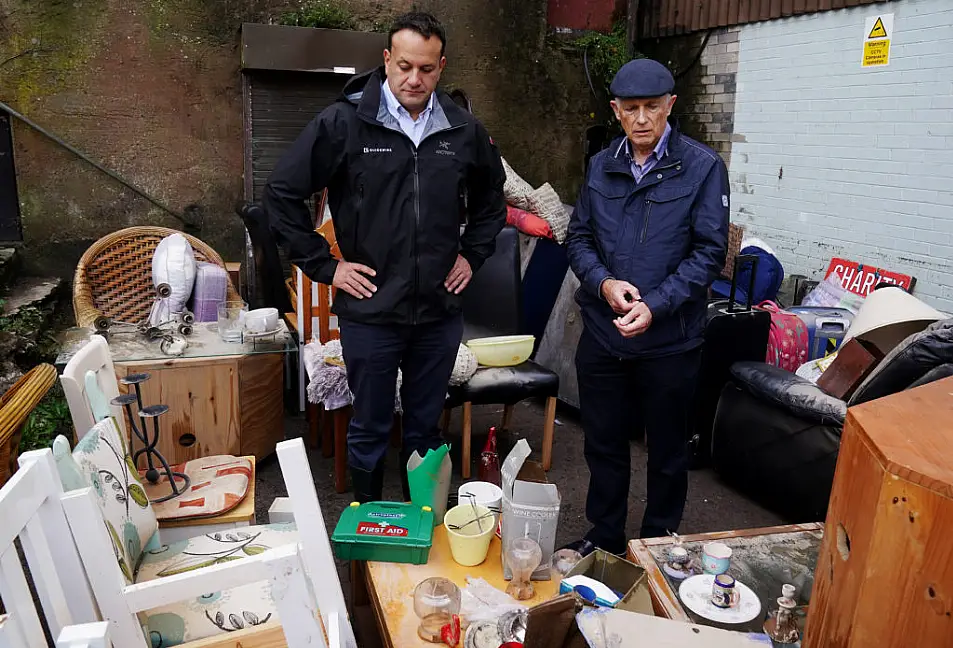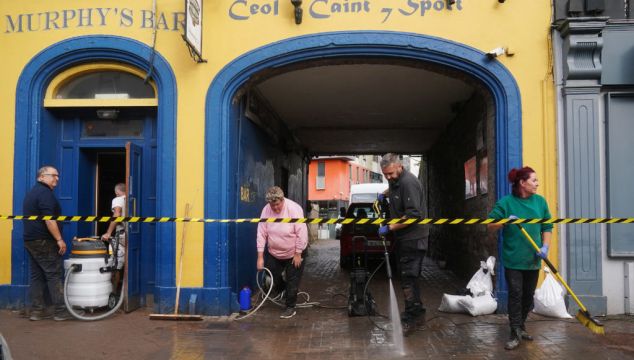Cork County Council is being asked to liaise with local authorities in the UK which have successfully implemented natural flood defences with a view to implementing such measures in towns such as Midleton, while residents wait for a planned flood relief scheme.
In late October, heavy rainfall arising out of Storm Babet led to the flooding of houses in the east Cork town, with the force of the deluge leading to smashed windows in business and flooding on roads in some places to five feet deep.
Councillor Liam Quaide of the Social Democrats is bringing a motion to the floor of Cork County Council during a meeting later today calling on the local authority to consult with their counterparts in the UK with a view to adapting similar natural flood defences and land management practices.
Cllr Quaide said that the weather event which occurred in October is our “new normal” and we need to adapt quickly and with all the resourcefulness we can muster.
"Any affected resident I’ve spoken to accepts that the Flood Relief Scheme will constitute the main solution for Midleton and that it is subject to a long and tedious planning process.
"However, there are land management practices that can be pursued in the interim that have been shown to be highly effective in other countries and should form a core component of our flood relief solutions in any case for Midleton, and more broadly in East Cork and across the county.
"I am urging Cork Co Council and the OPW to engage with Councils in the UK that have successfully implemented natural flood defences, which are essentially about respecting the force of nature and the need to work with it.
"Flood risk is a complex problem that will involve both engineering and nature-based solutions and will require close co-ordination between a number of agencies, including the Department of Agriculture. One such measure involves paying farmers to allow land to flood. Strategic planting of vegetation to soak up excess water is also key."
Damage
Cllr Quaide said that between 1999 and 2007, the town of Pickering in North Yorkshire was flooded four times, with the damage running to many millions of pounds.
He said that the town was refused a £20 million flood defence scheme as the cost was deemed too high to protect a limited number of residents.
“Locals engaged with the Environmental Agency and Forestry Commission to study the root cause of the repeated flooding which was water rushing off the nearby hills and dales. A project was developed that changed land management practices around the town that slowed the flow of water downstream.
"The town of Pickering has remained dry in recent years while other towns in the region have been repeatedly flooded by increasingly severe rainfall, fuelled by climate change.”
Cllr Quaide says that the success of the nature-based project in North Yorkshire has since been replicated in other communities in the UK.
"Strategic planting of trees and vegetation reduces the effects of flooding. Scientific research carried out by Bangor University into a land management project in Pontbren, Wales, which was pioneered by ten farmers, found that soil under mixed native trees absorbs water 67 times faster than under grass. Native trees have such deep roots that they provide channels to send the water much further underground. The soil under native trees absorbs water then releases it slowly.
"Between 1997 and 2016 the ten farmers had planted 120,000 trees, 5 per cent of 1,000 hectares. They reinstated 26.5 km of hedgerows and created 12 ponds covering 5.4 acres of ground. These ponds are essentially restored natural wetland sites which act as reservoirs.
"The research found that if all the farmers in the catchment followed their example, flooding downstream would reduce by 29 per cent. Full reforestation would reduce the flooding by 50 per cent or more."
Cllr Quaide adds that there are principles of natural flood defence and land management practices in these projects that we can learn from in East Cork and, in fact, need to learn from as a matter of great urgency.

"There are many more examples of natural flood management internationally. We also have the expertise here in Ireland. I’m acquainted with a native of East Cork who specialises in this area as an environmental consultant who would gladly work with the Council and other agencies on such measures. We have a company in Little Island that has pioneered many projects around the country involving constructed wetlands.
"I have been informed by experts that some of these solutions can yield results in the short as well as in the medium and long term. If we were to pursue such solutions we would see farmers in areas such as Lisgoold and Dungourney paid by the Department of Agriculture to restore hedgrows and trees and ponds, amongst many other measures that will benefit nature as well as protect our homes and businesses. There needs to be a multi-agency, whole catchment approach to the complex problem of flood risk.
"The Flood Relief Scheme (for East Cork) needs to be pursued with absolute determination. However, we also need interim measures that will complement and reinforce the benefits of that scheme, and that will go a significant way towards protecting us from the worst impacts of floods in the years ahead.”
Meanwhile, on a visit to Midleton in October, Taoiseach Leo Varadkar said that the Government will push to bring a flood prevention scheme for the town to planning next year. However, he warned that there is no guarantee that the infrastructure will be in place before another flooding incident in the town.
He added that some proposed schemes “get stuck in planning” and the courts due to environmental concerns.
A start date of 2027-2028 is flagged for the project. The scheme, which is expected to cost €50 million, will consist of five stages. It includes upstream storage, public realm works, direct defences and groundwater control measures.
The scheme was first launched for public consultation in 2017 after severe flooding in Midleton in 2015 and 2016.







